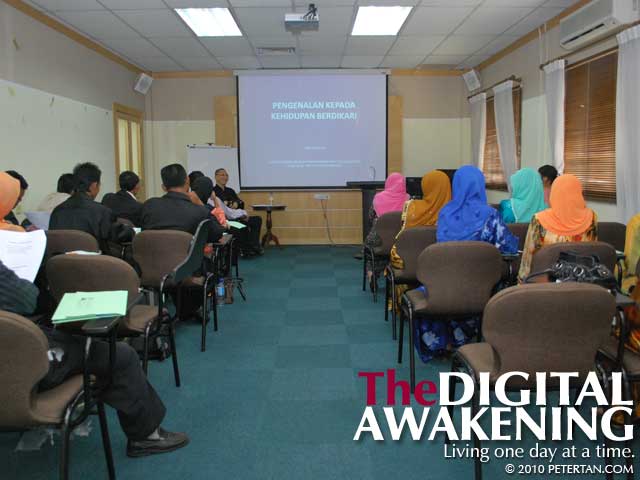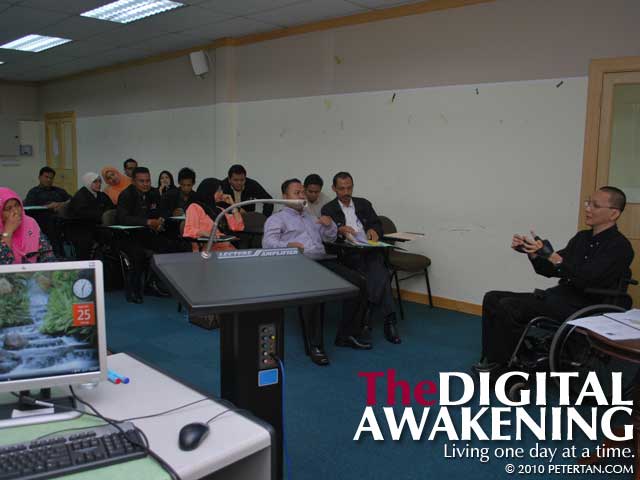Press Release: Human Rights Day 2010: “Against All Odds”
Thursday, 09 December 2010 10:40amOn 10 December this year, the Bar Council Human Rights Committee once again joins the rest of the world in celebrating Human Rights Day.
Our focus this year is on the rights of persons with disabilities.
Malaysia recently ratified the Convention on the Rights of Persons with Disabilities (“CRPD”). While the Malaysian Bar welcomes this move, there are still grave concerns on the Government’s reservations to Article 3 on general principles, Article 5 on equality and non-discrimination, Article 15 on freedom from torture or cruel, inhuman or degrading treatment or punishment, Article 18 on liberty of movement and nationality, and Article 30 on participation in cultural life, recreation, leisure and sport.
Malaysia has also not signed or ratified the Optional Protocols of CRPD, which grant specific rights to the citizens/residents of a country to refer their government to the international supervisory committee for non-compliance with any of the articles.
Locally, the Persons with Disabilities Act 2008 has yet to be amended to provide for any form of punishment or remedy for breaches.
These are fundamental issues that need to be addressed, to give full force and effect to the CRPD, without which the rights of persons with disabilities in this country are not even close to being fully acknowledged, what more protected.
Aimed at raising public awareness on rights of persons with disabilities, “Against All Odds” will feature a Public Forum on Persons with Disabilities Act 2008 that will take place on 12 December 2010 (Sunday) from 2:00 pm to 5:00 pm at the Bar Council Auditorium, No 15, Leboh Pasar Besar, 50050 Kuala Lumpur.
Invited panellists, and the topics of discussion, are:
(a) Professor Dr Tiun Ling Ta, President, Persatuan Orang Cacat Anggota Malaysia: “Opportunities in education – early, primary, secondary and tertiary”;
(b) Zakaria b Yahaya, Teacher, Sekolah Menengah Pendidikan Khas Setapak, Kuala Lumpur: “Observation and expectation from the vocational and recreational perspectives”;
(c) Helen Chin, advocate and solicitor: “Malaysia’s ratification of the UN Convention on the Rights of Persons with Disabilities and human rights for the disabled community in Malaysia”;
(d) A representative from the Human Rights Commission of Malaysia (SUHAKAM) (TBC): “Commitments by the government ministries and agencies”; and
(e) A representative from the Ministry of Women, Family and Community Development (TBC): “Enjoying life from human rights perspectives”.The forum will be conducted in both Bahasa Malaysia and English.
After a successful inaugural event in 2008, the Bar Council Human Rights Debate is now being featured again in conjunction with the Human Rights Day celebrations. It is a three-day event that will be held from 10-12 December 2010 (Friday to Sunday) at KDU University College, Section 13 Campus, No 76, Jalan Universiti, Petaling Jaya, Selangor.
Aimed at promoting free speech and creating greater awareness and education of human rights standards, while at the same time advocating important principles of international rights law, the theme for this year’s Human Rights Debate is “Against All Odds – Making a Difference for Human Rights”.
Out of RM30,000.00 prize money allocated from registration fees and corporate sponsorships, RM25,000.00 will be donated equally to five institutions caring or advocating for persons with disabilities from all over the country, to be selected by the Bar Council Human Rights Committee. The remaining RM5,000.00 will be awarded as prize money to the champion of the tournament.
Teams from 18 institutions, including some from India, Bangladesh, Philippines and Singapore, as well as local universities such as Universiti Malaya and Universiti Putra Malaysia, have registered for the tournament.
This is a unique debating tournament, the first in the world to be hosted by a statutory body of legal professionals.
Admission to both the public forum and the human rights debate tournament is free, and open to the public. Due to limited space, pre-registration is required in order to attend the public forum. To register, please contact Adi Irman by telephone at 03-2031 3003 ext 105 or by email at adi@malaysianbar.org.my.
Ragunath Kesavan
President
Malaysian Bar9 Dec 2010
Tag: Jabatan Kebajikan Masyarakat
The Path To Understanding Disability Issues
I am currently preparing training materials on Disability Equality Training (DET). Writing about disability in this blog is one thing, drawing up training modules for people who have little knowledge about disability is another matter altogether, more so when the people that I am facilitating are in the position to change things, if they so desire. How do I make them understand that impairments to the body do not necessarily lead to disability?
I have seen how effective Dr. Kenji Kuno used the process of facilitated participatory learning to conduct DET at the Jabatan Kebajikan Masyarakat Malaysia (JKMM) two weeks back. I was invited to co-facilitate with him at the event called “Intellectual Discourse Mengenai Disability Equality Training dan Independent Living” for officers from the JKMM at Jalan Raja Laut.
The various training modules were all centred around the Social Model of Disability as opposed to the Medical Model of Disability. The medical model is determined to diagnose, treat, cure and rehabilitate people to become “normal” again. In the social model, disability is seen as a social construct. It is people that creates an environment that disables other people. The social model respects the diversity in humanity and promotes equality through inclusion.
While I am appling the methods used by Dr. Kuno, I still need to come out with the training materials to suit my style and pace of conducting the course. I usually prefer to customise the course to suit the participants who have different levels of understanding of disability and the expected outcome from it, whether they are disabled people, non-disabled people or officers from the private sectors or government departments.
As I see it, DET is the most effective tool for promoting the understanding of the causes of disability. DET facilitators guide participants through as series of exercises that show disability as a social issue rather than a personal one. At the end of the course, participants come up with an action plan to resolve these issues.
DET promotes proactive behaviour towards creating an environment of equality for all. I like how the process of learning DET is structured with an outcome expected at the end. This is the tool that disability rights advocates should use to educate society with. DET allows people to understand disability through the process of discovering it themselves. This is more effective than giving a 2-hour monologue on disability and boring participants into slumber halfway through.
Independent Living Course At Institut Sosial Malaysia
The Institut Sosial Malaysia (ISM) under the recommendation of Dr. Kenji Kuno of the Jabatan Kebajikan Masyarakat Malaysia and Japan International Cooperation Agency invited me to speak on Independent Living for Disabled Persons (Kursus Kehidupan Berdikari bagi OKU – Sesi 1/2010) on Tuesday. The ISM conducts training for civil servants and social workers on matters related to social development.

Peter Tan conducting Independent Living course at Institut Sosial Malaysia.
The main office block and seminar rooms were located atop a hillock just at KM6 of the Lebuhraya Kuala Lumpur – Seremban. It commands a panaromic view of Bandar Tasik Selatan and the surrounding areas. About 20 social welfare officers and social workers participated in the four hour course spread over two sessions.The first session was Pengenalan Kepada Kehidupan Berdikari (Introduction to Independent Living) and the second on History of Independent Living.

Peter Tan sharing the history of Independent Living with participants at Institut Sosial Malaysia.
The practice of Independent Living was new to most of the participants as they were unaware that severely disabled persons too can live independently if given the right support and opportunities. After the sessions ended, I could feel that they got a pretty good grasp of what Independent Living is all about, especially how it is practiced in other countries such as the USA, Sweden and Japan, among others. And I need to brush up on my Bahasa Malaysia. There were more than a couple of times when I could not find the correct words to use and had to be “rescued” by the participants.
